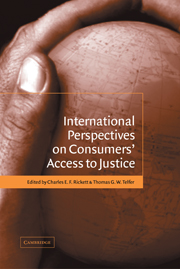Book contents
- Frontmatter
- Contents
- List of contributors
- Preface
- Table of cases
- Table of statutes
- 1 Consumers' access to justice: an introduction
- Part I Perspectives on consumers' access to justice
- Part II Issues in contract and tort
- Part III Services and the consumer
- Part IV Consumer bankruptcy law
- Part V Procedure and process issues
- 12 Privatisation and power: dispute resolution for the Internet
- 13 Armageddon through aggregation? The use and abuse of class actions in international dispute resolution
- Part VI Conflict of laws issues
- Index
12 - Privatisation and power: dispute resolution for the Internet
from Part V - Procedure and process issues
Published online by Cambridge University Press: 11 July 2009
- Frontmatter
- Contents
- List of contributors
- Preface
- Table of cases
- Table of statutes
- 1 Consumers' access to justice: an introduction
- Part I Perspectives on consumers' access to justice
- Part II Issues in contract and tort
- Part III Services and the consumer
- Part IV Consumer bankruptcy law
- Part V Procedure and process issues
- 12 Privatisation and power: dispute resolution for the Internet
- 13 Armageddon through aggregation? The use and abuse of class actions in international dispute resolution
- Part VI Conflict of laws issues
- Index
Summary
Introduction
Despite clichés about ‘Internet speed’, disputes that arise on and about the Internet can be time-consuming to resolve, factually complex and legally murky. In response, Internet players with market power are opting out; mandatory arbitration is replacing both substantive law and court procedure, and technological ‘remedies’ are providing self-help without any ‘dispute resolution’ at all. These alternative procedures tend to move faster than courts and cost their corporate creators less than lawsuits. They are also structured to maximise the success of the powerful. But faster is not always better. Cheap is not always fair or accurate. Market power is not always used to achieve the public good. And the power to make the rules is often the power to win the game. The Internet is a largely privatised world, and private actors are creating structures under which governments and their courts are increasingly irrelevant. Some enthusiasts, in fact, look forward to the day when computer code makes courts unnecessary. Bill Frezza, in Internet Week, envisioned complete automation of Internet dispute resolution and enforcement: ‘What if there were a way … that does not rely on judicial intervention to interpret rights or the police power of the state to enforce them? A way in which laws, along with their enforcement, could be designed into the products or transactions themselves?’
Ironically, this freedom from government control is supported by the government. In 1997, the Clinton Administration released a document setting out a blueprint for the promotion of electronic commerce.
- Type
- Chapter
- Information
- International Perspectives on Consumers' Access to Justice , pp. 303 - 329Publisher: Cambridge University PressPrint publication year: 2003



